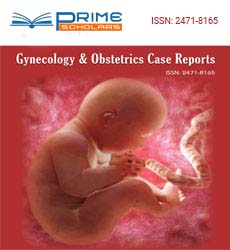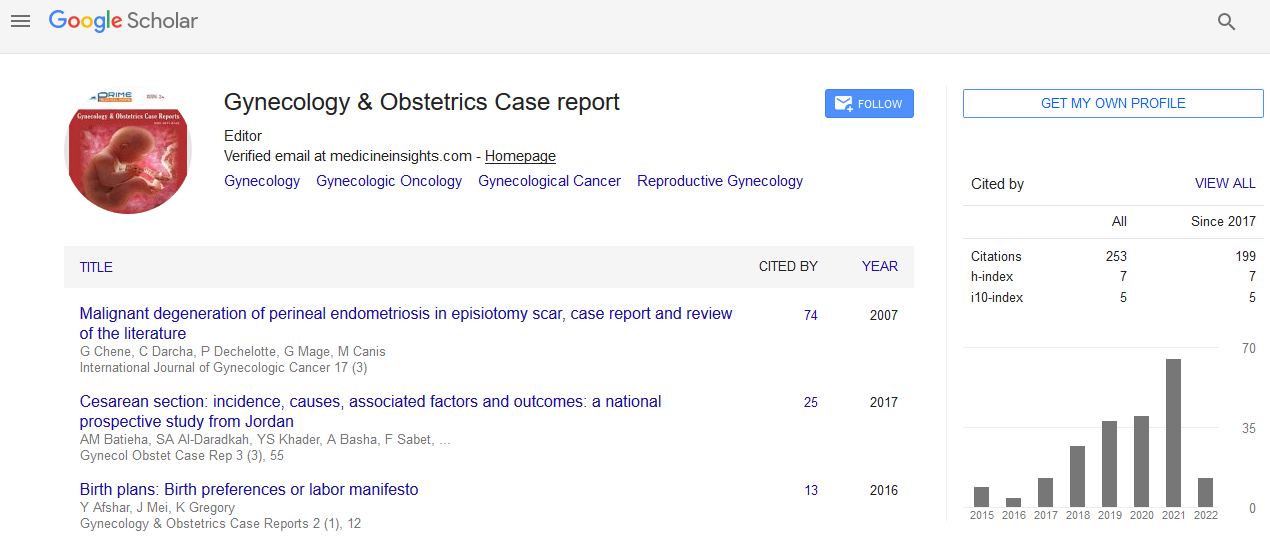Iqbal S1*, Iqbal J2, Nowshad N1 and Mohammad K1
1Department of Obstetrics and Gynecology, Latifa Hospital, Dubai Health Authority Jaddaf, Dubai, UAE
2Department of Medical Education, Dubai Medical University, Dubai, UAE
- Corresponding Author:
- Iqbal S
Department of Obstetrics and Gynecology
Latifa Hospital, Dubai Health Authority Jaddaf, Dubai, UAE
Tel: 971569400124
E-mail: suiqbal@dha.gov.ae
Received Date: March 31, 2020; Accepted Date: May 02, 2020; Published Date: May 06, 2020
Citation: Iqbal S, Iqbal J, Nowshad N, Mohammad K (2020) Successful Treatment of Cervical Ectopic Pregnancy with Multi Dose Methotrexate Therapy. Gynecol Obstet Case Rep Vol.6 No.2:14 doi:10.36648/2471-8165.6.2.94
Keywords
Ectopic pregnancy; Cervical pregnancy; Methrotrexate; Gynaecology
Introduction
A cervical ectopic pregnancy (CEP) is an ectopic pregnancy,
implanted in the uterine endocervix. It is a rare condition with
an incidence of less than 0.1% of all ectopic pregnancies. It is
associated with a high morbidity and mortality. The etiology
of CEP is not fully understood but reported risk factors for
CEP include history of pelvic inflammatory disease, smoking,
previous pelvic surgery, previous ectopic pregnancy, intrauterine
device use, anatomic anomalies, previous cesarean delivery,
previous uterine or cervical surgery, in vitro fertilization and
diethylstilbestrol exposure [1].
Case Report
A 37-year-old lady, G3P0+2 pregnant for 9 weeks and 4
days, conceived by Invitro Fertilization (IVF) presented to the
emergency with bleeding per vagina and mild lower abdomen
and back pain. This started initially as brownish vaginal discharge
and further progressed to frank vaginal bleeding. It soaked half a
pad of blood over the span of 2 hours. Beta-hCG which was done
5 days ago showed a reading of 950 mIU/mL.
She has a history of two previous first trimester miscarriages.
The first miscarriage was managed by Evacuation of Retained
Products of Conception (ERPOC) and second miscarriage was
medically managed. The current pregnancy was conceived by
IVF- Intracytoplasmic sperm injection (ICSI) and 2 embryos were
transferred.
She is a known case of Grave's disease and had radioactive iodine
therapy in 2004. Following that, she developed hypothyroidism
and is currently on thyroxine 100 mcg for 4 days and 50 mcg for
3 days.
In the emergency, her pain score was 1/10. She was vitally stable
with BP of 138/84, Pulse: 85, Resp: 16, Temp: 36.7°C, SpO2: 100%.
On general examination, she was anxious, lying comfortably with
no acute distress. Her abdomen was soft and non-tender without
masses or organomegaly. The pad was soaked with period-like
moderate bleeding and no clots were visible.
Vaginal exam showed no tenderness and closed cervical os. On
speculum examination, minimal bleeding was noted along with ballooning of the cervix. Bedside transvaginal ultrasound scan
shown in Figure 1 elicited no probe tenderness, and revealed
an empty uterus with a single gestational sac with a yolk sac
measuring 7.4 mm in the cervical canal. It was corresponding to
5 weeks without a fetal pole and fetal heart. There was evidence
of small subchorionic hematoma behind the sac.
Figure 1: TVUS demonstrates an hourglass shaped uterus with empty uterine cavity, closed internal OS, a gestational and yolk sac corresponding to 5 weeks without a foetal pole and fetal heart, in the cervical canal.
The patient was admitted as an ectopic cervical pregnancy
and was started on Methotrexate (MTX) Hybrid double dose
Protocol with 2 equal doses of MTX 76 mg (50 mg/m2) each to
be administered intramuscularly on day 1 and day 4. Two units
of blood were crossmatched and saved. The couple were then
explained about the risk of heavy bleeding, uterine perforation,
ERPOC, laparoscopy repair, or a Hysterectomy in case of lifethreatening
bleeding.
Her Complete Blood Count showed Hemoglobin to be 11.8, MCV
84.9, WBC 9.2, HCT 36.0, and Platelets count of 290,000.
The total Beta-hCG before admission was 950 mIU/mL. The first
dose of MTX was given on Day 1and second dose of MTX was
administered on day 4. As shown in Figure 2, the value of BetahCG
kept rising and the patient was experiencing continuous vaginal bleeding. Therefore, it was decided to proceed with
Multi-dose MTX therapy and administer 2 more doses of MTX.
She received the 3rd dose on Day 9 and 4th dose on Day 15. As
she was clinically improving, and Beta-hCG was gradually falling,
she was discharged with weekly follow up in clinic for Beta-hCG
levels, which is also shown in Figure 2.
Figure 2: A line graph representing the trend of Beta-hCG levels during multi-dose methotrexate therapy. Arrow indicates the MTX injection.
Discussion
The most common symptom of Cervical Ectopic Pregnancy (CEP)
is vaginal bleeding, which is often profuse and painless. Lower
abdominal pain or cramps occur in less than one-third of the
patients, however pain without bleeding is rare. This presentation
in early pregnancy should raise concern for CEP. Early diagnosis
is critical to avoid severe blood loss and ensure successful
treatment. Early CEP can be asymptomatic and is usually found
incidentally on ultrasound scan. Unlike tubal ectopic pregnancy
where the bleeding is inside the peritoneal cavity, the main risk
of cervical pregnancy is uncontrolled vaginal bleeding [2].
Diagnosis can be made on seeing the following features
on Ultrasound--an empty uterus, a barrel-shaped cervix, a
gestational sac present below the level of the internal cervical
OS, the absence of the ‘sliding sign’ and blood flow around the
gestational sac using color Doppler. Early, accurate diagnosis
is the key factor in the conservative management of cervical
pregnancies. Gestational age less than 12+0 weeks with absence
of fetal cardiac activity and lower serum Beta-hCG levels are
associated with more successful conservative management [3].
There are no established criteria for candidates for medical
versus surgical treatment as there are for tubal ectopic
pregnancy. MTX is first-line therapy for hemodynamically
stable women and immediate surgery is required if a patient is
unstable. For persistent bleeding after MTX treatment, dilation
and endocervical curettage is performed. If these measures fail,
the continuous bleeding may be treated with uterine artery
embolization (UAE) and then hysterectomy. Multiple injections of
intracervical vasopressin can be given around the circumference
of the exocervix. Other measures include transvaginal ligation of
the cervicovaginal branches of the uterine artery. The suture is
placed high just below the lateral vaginal fornix, similar to sutures
placed for hemostasis during cold knife conization [2].
A retrospective analysis was done at St George's Hospital,
London between April 1997 and September 2004 of all CEPs
diagnosed in women attending the early pregnancy unit. CEPs
with no visible cardiac activity were advised to use a single dose
of methotrexate as first‐line management as there appears to
be no advantage with multiple‐dose regimen in these cases. For
CEP with fetal cardiac activity, initial treatment should ideally
be local methotrexate or potassium chloride injection with or
without interval curettage. If such techniques are not available
then multiple‐dose systemic methotrexate is an alternative [4].
A case of CEP was reported by Sijanović, Siniša et al. where ultrasound guided intra-amniotic methotrexate was unsuccessful
and ultimately needed hysteroscopic resection due to severe
uncontrolled bleeding [5]. Singh S. reported a case of CEP where
cervical tamponade was performed with a Foleys catheter, along
with a single-dose intramuscular methotrexate and manual
vacuum aspiration. It had a successful outcome [6].
Jaeger et al. reported a case where both cervical and rectal
tamponade were used. Intraoperatively a prostaglandin-filled
tamponade was placed into the cervical canal. Further profuse
bleedings were controlled by the placement of a blocked Foley
catheter into the endocervix. A “counter” tamponade of the
rectum was performed to ensure sufficient compression and
hemostasis. After 24 h the tamponade was removed [7].
Conclusion
In conclusion, CEP is extremely rare in occurrence and no
definitive treatment guidelines are available. A physician must
be competent in managing such cases of ectopic pregnancy on
an individual basis, keeping the hemodynamic stability of the
patient in mind.
Acknowledgement
None.
Statement of Ethics
The patient has given written informed consent to publish this
case (including publication of images).
Disclosure Statement
The authors have no conflicts of interest to declare.
Funding Sources
None.
Author Contributions
SI conceived the presented idea of the case report. SI and NN
developed the theory . JI supervised the findings of this work
and helped implement the case report. KM contributed to the
editing of the manuscript. All authors discussed the results and
contributed to the final manuscript.
References
- Takeda K, Mackay J, Watts S (2018) Successful management of cervical ectopic pregnancy with bilateral uterine artery embolization and methotrexate. Case Rep Emerg Med p. 1-4.
- Tulandi T (2019) Cervical pregnancy. Up-to-date.
- Spitzer D, Steiner H, Graf A, Zajc M, Staudach A (1997) Conservative treatment of cervical pregnancy by curettage and local prostaglandin injection. Hum Reprod 12(4): 860-866.
- Kirk E, Condous G, Haider Z, Syed A, Ojha K, et al. (2006) The conservative management of cervical ectopic pregnancies. Ultrasound Obstet Gynecol 27(4): 430-437.
- Sijanovic S, Vidosavljevic D, Topolovec Z, Milostic-Srb A, Mrcela M (2014) Management of cervical ectopic pregnancy after unsuccessful methotrexate treatment. Iran J Reprod Med 12(4): 285-288.
- Singh S (2013) Diagnosis and management of cervical ectopic pregnancy. Journal of Human Reproductive Sciences 6(4): 273.
- Jaeger C, Hauser N, Gallinat R, Kreienberg R, Sauer G, et al. (2006) Cervical ectopic pregnancy: A surgical or medical treatment? Gynecol Surg 4(2): 117-121.



